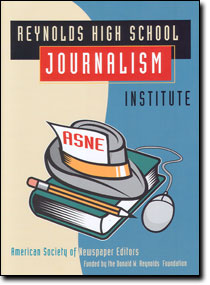Missouri School of Journalism Receives $590,000 Grant to Host Reynolds High School Journalism Institutes
Columbia, Mo. (April 16, 2007) — The American Society of Newspaper Editors and the Donald W. Reynolds Foundation has awarded the Missouri School of Journalism $590,000 over the next three years to host an innovative training program for high school journalism advisers nationwide.

From July 8-20, the School will offer its first Reynolds High School Journalism Institute, an intensive training program for 35 high school advisers recruited by ASNE. The organization received a $2.3 million, three-year grant from the Donald W. Reynolds Foundation to provide programs enabling high school teachers to become effective journalism advisers. Other host sites include Arizona State University, Tempe, and the University of Nevada, Reno. The program will continue through the summer of 2009.
Earnest Perry, associate professor and chair of journalism studies, will direct Missouri’s training institute with assistance from many of the School’s professors and in-house professionals, including Charles Davis, associate professor of journalism studies and Rob Weir, Knight Editing Chair Fellow at the School.
“This is an opportunity for the School of Journalism to build a bridge between what we do here and high school journalism teachers,” Perry said. “We want to help teachers take quality journalistic tools and knowledge back to their respective schools to work with their students.”
During the two weeks of training, competitively selected newspaper advisers will be steeped in journalistic practices and responsibilities, ethical decision making and press freedom issues. ASNE’s recruitment includes intensive outreach to schools in urban and rural areas where journalism programs are most under stress.
“This program is a linchpin in ASNE’s ambitious efforts to nurture the next diverse generation of young journalists, build independent scholastic media and help all teens gain a greater appreciation of the First Amendment. The Reynolds Institutes will provide a unique, top-flight training and support system for journalism advisers,” said ASNE President David A. Zeeck, executive editor of The News Tribune, Tacoma, Wash. “We are most grateful to the Reynolds Foundation for sharing in this vision and making this generous and substantial commitment.”

Every key expense is covered by the grant, including travel, housing, meals, tuition, graduate/continuing education credits and instruction materials. This removes financial obstacles for teachers who can’t afford to pay for this kind of specialized training or who teach in cash-strapped school districts. With the financial support of the John S. and James L. Knight Foundation, ASNE trained more than 1,000 high school teachers from 2001-06. The Knight Foundation continues its important support of other core programs of the ASNE High School Journalism Initiative.
The Reynolds High School Journalism Institute is the newest of several resources at the Missouri School of Journalism for scholastic journalism. The School is the headquarters for the Missouri Interscholastic Press Association, a program that trains middle and high school journalism teachers and students, in addition to the Missouri Urban Journalism Workshop, one of the country’s oldest high school journalism workshops. The School also offers online journalism certification for practicing high school teachers, as well as an online Master of Education degree with an emphasis in journalism through the MU College of Education.
The Donald W. Reynolds Foundation is a national philanthropic organization founded in 1954 by the late media entrepreneur for whom it is named. Headquartered in Las Vegas, it is one of the largest private foundations in the United States.
ASNE is the principal organization of the top editors at daily newspapers. Founded in 1922 as a non-profit organization, ASNE focuses on professional development and journalism-related issues, including the First Amendment, diversity in newsroom staffing, coverage of diversity issues, journalism education, editorial innovation and credibility.
Updated: April 16, 2020